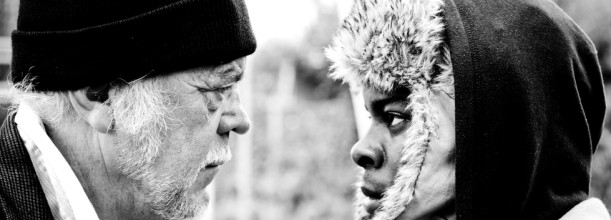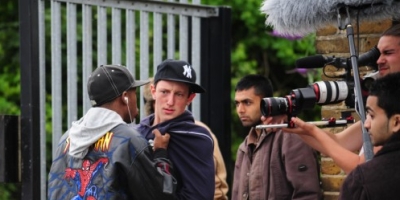Interview! We talked to Tarun Thind, director of English

English is a short film following a day in the lives of two judgement-prone teenagers, English and Jehst. The film follows them through a series of altercations, which on the surface, certainly seem textbook. However, there’s a Hitchcock-style MacGuffin that’ll knock your socks off. Funded entirely without sponsorship or grants, director Tarun Thind pulled off an absolutely stellar piece of work, and we’ve asked him how he did it. We highly recommend watching the film first before reading the interview.
[swfobj src=”http://vimeo.com/moogaloop.swf?clip_id=29920906&server=vimeo.com&color=00adef&fullscreen=1″ width=”600″ height=”338″]
Disability and urban culture aren’t two things most people imagine going as seamlessly hand-in-hand as you’ve done in English. Was it important to have a deaf and non-deaf pair of actors playing English and Jehst?
I always wanted to portray the frustrations of our young generation in English. I was fed up of the negative press I was constantly coming across, and having worked with a lot of young people through the years I knew not all of them were like the ones portrayed in the news. They are a generation unheard; through using the device of deaf characters I wanted to give the voiceless a voice.
It was important to portray the deaf world as accurately as possible, so I knew I wanted a deaf actor in at least one of the lead roles. After searching rigorously, I eventually came across Alex Nowak (Jehst). Pairing him with the talented Leon Wander (English), the two worked really closely, with Alex even teaching Leon the sign language seen in the final scene.
What made you decide to shoot in black-and-white rather than conventional colour? We sort of saw it as a visual allegory for the world in which deaf people live – exactly the same as ours, but with something massive missing.
That is spot on! In addition to it being a stylistic choice, just to enhance the dark undertone of the film, I wanted to shoot in black and white as a way to visually represent the characters’ world. The film deals with many metaphors, and the black and white picture is used to represent the young protagonists’ bleak perception of the world around them.
Why did you choose to incorporate the quotes you’ve put on the walls and in English and Jehst’s dialogue at the end of the film? It’d be terribly easy to fall into the trap of making the film’s message sound treacly and cliché, which you’ve successfully avoided.
“Of those who say nothing, few are silent” was a proverb I had jotted down in my writing book for many years – it became my mantra during the writing process.
In the original version of the story, the events were meant to have taken place on English and Jehst’s way to school. I had written English’s character to be quite philosophical and studious – he is a representation of how intellect can exist for an urban youth, despite misconceptions to the contrary -English’s intelligence is also a nod to the legendary music of the Wu Tang Clan.
What was it about the notion of silence that made you want to put it in such an aural medium?
I’ve always found silence in film poetic. Films about ‘urban’ culture often fall victim to feeling the need to be loud and ‘in your face’, whereas with English I wanted to take a more understated approach.
I wrote the sound design almost like it was its own character in the film; it played an integral part in telling the story and representing the deaf characters’ world. The absence of sound was meant to create a feeling of suspense; for example, in the first scene we see a soundless train pass by in the background, giving the audience reason to question its absence whilst allowing them to momentarily experience English’s and Jehst’s silent world.
English and Jehst are pretty unusual names; is there any reason for those, and why was it that English so often designates himself as Jehst’s protector?
I wanted Jehst’s character to be comical, a bit of a jester, hence Jehst was fitting. However, the name was initially derived from one of my favourite hip-hop artist’s, Jehst, whose music I was heavily listening to at the time of writing English.
As for the name English – when writing the film I thought it would be ironic for the protagonist who doesn’t speak the language to be called English. Speaking strictly from the character development stance, I always imagined it as the name given to him by Jehst, whose character is a lot less concerned with being deaf. Jehst’s nonchalant and mischievous attitude to being deaf gets them into several altercations, which English, being the more sensitive to his disability, has to defuse. The two balance each other out.
Do you think it’s important to present the realities and idiosyncrasies of urban youth life to an audience which is ostensibly middle-class, as avid short-film fans are wont to be?
I believe it’s very important. I think the elite middle-class running this country have, for too long, ignored the voices of the disadvantaged youth. English was completed in 2010 and the following year we had the riots – so it was, and, still is an issue that needs attention. As great as the Olympics are for Great Britain, it is very important not to cover up and forget some of the real issues at the heart of British society today – issues which I believe still haven’t been addressed since last summer’s riots.
Was it prudent to have English and Jehst play into the same stereotypes which were highlighted as unjustified earlier in the film?
I think this is an important question. I don’t believe the shopkeeper was entirely innocent, as he was hostile towards the homeless man; more importantly, he was the culprit of judging both English and Jehst based on their appearance alone. As such, in the context of the film, the shopkeeper represents society as a whole, who pre-judges English and Jehst. Without giving them a chance to explain, he breaks their pencil (a metaphor for the communication barrier between young and old) before throwing them out of his shop. With the communication barrier broken, the pair result to extreme measures as a way to be heard and get back their pencil. They find their own unique way to get justice.
Similarly, as senseless as last year’s riots may have been, it is important to try and understand what caused these young people to take such extreme measures. As an avid movie fan, I believe it is important to give the audience the option to form their own opinions about characters – the same way in which traditional art does. Just like in life, I prefer my protagonist(s) to be flawed; it’s what makes us human.
If you were to present English to a group of young people such as those who rough English and Jehst up a little in the street, what do you think they’d say? What would you want them to say?
I actually teach in an inner London school, where the pupils are from severely disadvantaged backgrounds. Having shown them English, they all positively engaged with the piece. As well as being able to relate to the prejudice experienced by English and Jehst, it was through the ‘gang’ that rough English and Jehst up that I learned most about my students’ views. Many of them were still able to relate to the ‘gang’ – not because of their confrontational behaviour but because of the cause of this behaviour, their insecurities.







Recent Comments